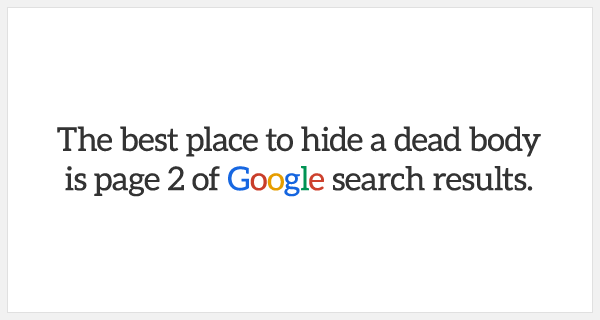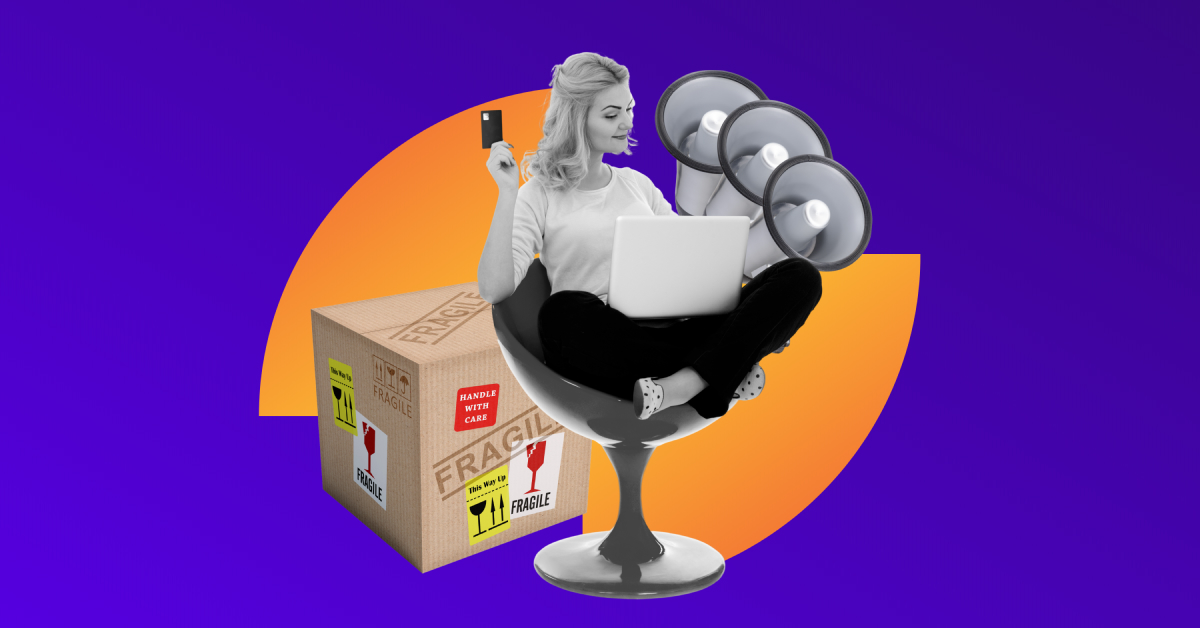What's the first thing you'd do when you're thinking of buying a product?
Probably go to Google and search for it, right?
Then you'll look at the top search results and go from there.
That's why they always say...

(Source)
Why?
It's because, according to a study, 71% of search traffic goes to the first page results of Google. At the same time, the second page has below 6%.
Hmm... it's really best to hide a dead body on page two, right?
But you're not hiding a dead body. In fact, you want your products to be seen. And that means you have to be on the first page of the search results.
So, you need to plan your Search Engine Optimization strategy to the fullest extent.
And you'll be armed with tips on how to nail your Ecommerce SEO strategy for your online store!
Let's get down to business!
What is Search Engine Optimization?
SEO or Search Engine Optimization is a digital marketing strategy. It aims to improve the visibility of your website on search engines.
It focuses on "organic" or unpaid traffic instead of paid, which is a part of SEM or Search Engine Marketing.
Search Engine Optimization takes a lot of effort before you see its success, but it definitely has a lot of benefits... which leads us to our next part!
What Are The Benefits Of Search Engine Optimization For Your Shopify Store?

Search Engine Optimization is a helpful way to reach your eCommerce goals.
Here are some of its benefits:
1. Increase Brand Awareness
When a prospect searches for a product or service, your website can appear on the first page results.
For example, you're selling oils. But they're not yet aware of who you are. They're simply looking for "essential oils."
Now, if you're successful in making your website top the SERPs or search engine results page in that keyword... then that's brand awareness if they click on your page.
The next benefit is...
2. Budget-Friendly
Search Engine Optimization means "organic traffic." You don't have to pay a sum to drive people to your website.
That makes it budget-friendly, but it's not free.
Why?
Because you need to invest your time in learning the SEO fundamentals to succeed. Or you need more time to write and optimize your content.
You might also need third-party tools or hire someone to do it for you.
So, even if it's unpaid traffic... you really need to invest time and some resources.
But it's worth it because Search Engine Optimization offers...
3. Long-Term Results
Did you know that almost 60% of the web pages in the top 10 results of Google are more than three years old?
Yep, Search Engine Optimization gives long-term results!
It means you can experience the benefits of SEO for a more extended period.
Sure, it might take some time to get the results. But it's going to be worth every effort, right?
You just have to do it right.
And to help you with that, here's how to...
Plan Your Shopify SEO Strategy For 2022
You're going to learn how to build an SEO strategy and ensure its continued success.
Are you ready? The first thing you need to do is...
1. Research The Keywords
Keyword research is a big part of Search Engine Optimization. That's why you should start with learning how to research your target keywords properly.
And heads up, there are different types of keywords:
- Short tail. These are up to 3 keywords. For example, your website can appear if someone searches for a "lightweight bottle."
- Long-tail. These are keywords with a lower search volume. These are phrases that consist of relevant keywords for your eCommerce store. For example, "lightweight insulated water bottle sustainable."
- Short-term fresh keywords. As the word suggests, these are usually hyped keywords. It doesn't have a large search volume because it's "fresh."
- Long-term evergreen keywords. Evergreen also means fresh, but these are keywords that stay fresh or relevant. And these keywords usually have a large search volume.
- Product defining. Product defining keywords are specific to your products. For example, "pink lightweight water bottle."
- User intent. Customer-defining keywords are focused on the target customers. For example, "safe toys for kids."
- Intent-based. Keywords intent show the purpose of the search.
Knowing which keywords to use is crucial because these will determine where you're going to rank. You can either rank on the long tail or short-term keywords.
You can also use your target keywords on your meta description, meta title, and headlines.
So, make sure to research your keywords properly using a third-party keyword research tool or Google Keyword Planner.
The next thing you need to do is...
2. Write High-Quality Content

To make sure your website can rank higher on SERPs or search engine results pages, you need to write high-quality content.
And content marketing, specifically blogging, can help you with this. Here's how:
- Educate your audience. You can write relevant and informational content that your prospects would enjoy reading. They searched for your keywords because they were looking for an answer. Make sure to give them what they're looking for.
- Talk using their language. Talk to them in a way they'd understand. As much as possible, avoid using too much jargon because they might not be able to grasp what you're talking about immediately.
- Think of a catchy headline. Before they proceed on reading your entire content, they would see the headline first. So to catch their attention, write a catchy and attractive headline without misleading them.
Remember, the quality of your content also plays a big role in your ranking. Write a great blog!
What's next?
3. Optimize Your Page
Optimizing your page is also important in ranking your website.
What do I mean by this?
It means you need to ensure the quality of your website, and it goes beyond using relevant keywords. Because this includes the nitty-gritty part of your website that is often overlooked.
Here are some examples of how to optimize your website:
- Use Keywords on your URL.
- Alt Text on your images.
- Use keywords on your meta title tags and meta descriptions.
- Include internal links.
- Have a fast-loading website.
See to it that you include these in your checklist when optimizing your website to increase your chances of ranking higher on Google search. You can also use Google Search Console to improve your performance.
Another one you need to do is...
4. Optimize For Search Intent
Search Intent Optimization means optimizing to immediately meet your prospects' needs.
But wait, why is this important?
This will help you build credibility because you're providing answers to your prospects.
Here's an example:

You can achieve this by using obvious keywords your prospects would use.
Since they're looking for an answer, what do you think they would type in the search box or search queries?
Yep, they're going to ask questions!
So, don't forget to always put your target market in your mind while planning the keywords for your Search Engine Optimization strategy!
The next one is...
5. Use Links
Linking is important in Search Engine Optimization. This is helpful in driving traffic to your website, especially if you have excellent on-page SEO and high-quality content.
Here are different types of linking:
- Backlinks. This includes having other websites link back to your website. This will also help you rank higher on SERPs.
- Internal linking. This is linking your users to other parts of your website. You won't lose the traffic because you're also redirecting them to your website.
- External linking. For this, you're redirecting your users to another website. But make sure to link to authority websites.
To succeed in link building, improve your website's authority and credibility so more websites will redirect their readers to yours.
After planning your linking strategies, don't forget to...
6. Analyze The Results
Once you have kicked off your Search Engine Optimization strategy, don't forget to analyze the results.
Why do you need to?
Because you can optimize your SEO strategy once you find out what's working and not.
As I said above, Search Engine Optimization takes a lot of time. It doesn't give you immediate results. This means you always have to adjust your strategy.
While analyzing, make sure to check these out:
- Organic Traffic
- Unique Page Views
- Page Views
- Referral Traffic
- Keyword Ranking
- Pages Per Session
- Average Time On Page
- On-Page Optimization Scores
- Bounce Rate
- Leads
Once you take note of these numbers, you'll find which areas need improvement. Optimizing is important!
For example, you have a high bounce rate. You need to analyze what are the things prompting your visitors to bounce off your page. Also, check if there are broken links.
So, you can...
7. Keep On Improving And Updating Your Content
Creating an SEO strategy doesn't stop at analyzing the results.
It's actually a process.
Because SEO is constantly changing. And your competitors are also doing their best to get to the first page.
So, just because you think you nailed it doesn't mean it will stay that way for a long time. It's a long-term game.
That's why you need to improve your content and enhance your strategy to see how you can get better results. Try different things, but make sure they're data-driven.
Also, updating your content will keep its relevancy and accuracy. And it can help avoid duplicate content.
So, are you ready?
Optimize Your Content And Rank Higher On Search Engines!
When planning your Search Engine Optimization strategy, it's best to aim HIGH.
You shouldn't aim for mediocrity. Make sure you aim for PAGE ONE..
Aside from this Shopify SEO guide, there's another way to help you achieve this... it's by providing a good user experience to your website visitors.
And Debutify is a Shopify theme that can provide that experience!
It's a fast-loading theme that will give your visitors a great experience on your website. It has 50+ Add-Ons that can also optimize your profits.
What are you waiting for?
Try Debutify For Free And Optimize Your Shopify Store!
14 Days Trial. 1 Click Installation. No Credit Card Required.






